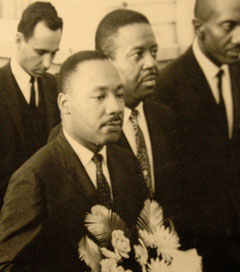“It is a crime for people to live in this rich nation and receive starvation wages. And I need not remind you this is our plight as a people all over America.” – Martin Luther King in Memphis, March 18, 1968
April 4 marks forty-three years since an assassin killed Dr. Martin Luther King, Jr., in Memphis. That date has special meaning this year.
“We Are One” events all over the U.S. are fighting for collective bargaining rights, and more broadly, a reversal of the current priorities and direction of events. The connection of today’s union rights battle to King’s legacy is clear. The strike of Memphis sanitation workers revolved around Mayor Henry Loeb’s refusal to grant collective bargaining rights and union dues collection.
These are the same rights that Governor Scott Walker just took away from public employees in Wisconsin. Like Loeb, he knows this is a good way to kill a union. Who would choose to belong to and pay dues to a union that cannot represent them at the bargaining table?
People across the country today are protesting the Republican attempts to utterly destroy the unions. They are virtually the only group that still has the power to stand up against the power of organized money.
King supported unions from his earliest college days and called them the “first anti-poverty program.” Unions provided King with staunch allies and provided his greatest financial support in the Montgomery bus boycott, the Birmingham movement, the March on Washington, and other battles.
Mainly because of King’s sacrifice, the sanitation workers in Memphis won their strike. Their union, the American Federation of State, County and Municipal Employees (AFSCME), now represents millions of government workers, including many African Americans workers in the District of Columbia. Unionists regard King as an honorary member and practically a founder of AFSCME.
That’s exactly the union Republicans want to kill. AFSCME and a few other large unions provide the only major counter weight to corporate money in elections. Kill the unions, and you cripple the Democrats and the ability of working-class folks to resist the political power of organized money.
While the Arab world struggles in pro-democracy movements, we in the U.S. are struggling to keep the union rights that King and others died to achieve. Unions are an endangered species, as they were in Memphis before King came to that city. Those of us rallying today feel we are making King’s legacy real in our own lives. And we feel Americans need to reframe their understanding of King and his legacy.
Many think of King as purely a civil rights leader. In addition, we need to recognize his fierce advocacy of labor rights and economic justice. A child of the depression, King always expressed solidarity with poor people. They included his neighbors, his parishioners, and his family. His father fled sharecropping and arrived in Atlanta with only a few dollars; his grandparents had worked hard laboring jobs; three of his great-grand parents were slaves.
King was not only a leader for civil rights, which he called “phase one” of the freedom movement. “We Are One” demonstrations on April 4 remember King’s launch of “phase two,” his Poor People’s Campaign demanding a shift in government priorities from warfare and tax cuts for the rich to creating jobs and enhancing health care, housing and education.
King had been on this path for a long time, speaking at union meetings all over the country. He told the Illinois AFL-CIO in 1965, “It is a constitutional right for a man to be able to vote, but the human right to a decent house is as categorically imperative and morally absolute as was that constitutional right. It is not a constitutional right that men [and women] have jobs, but it is a human right.”
King also warned the AFL-CIO at its national convention in 1961 that an alliance of business and right wing politicians in the future would threaten “everything decent and fair in American life.” They are doing it now.
On this April 4, we should remember King’s words to the Memphis sanitation workers: “All labor has dignity… You are going beyond purely civil rights to questions of human rights.” There is no better time than the present to follow King’s lead and stand up for the rights of working and poor people.
Michael Honey is editor of King’s labor speeches, “All Labor Has Dignity” (Beacon) and author of “Going Down Jericho Road: The Memphis Strike: Martin Luther King’s Last Campaign” (Norton).
Join us in defending the truth before it’s too late
The future of independent journalism is uncertain, and the consequences of losing it are too grave to ignore. To ensure Truthout remains safe, strong, and free, we need to raise $50,000 in the next 9 days. Every dollar raised goes directly toward the costs of producing news you can trust.
Please give what you can — because by supporting us with a tax-deductible donation, you’re not just preserving a source of news, you’re helping to safeguard what’s left of our democracy.
